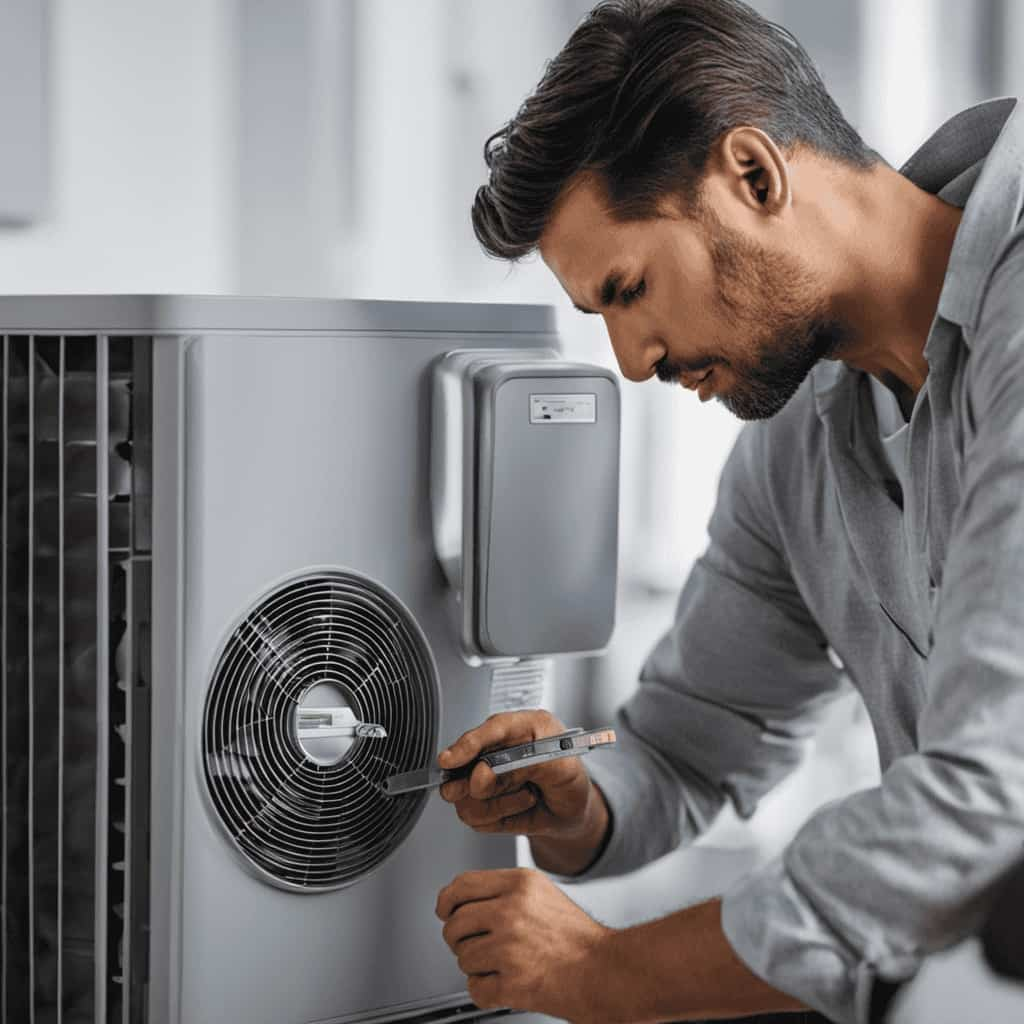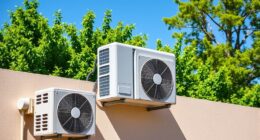Do you want to stop shivering in the winter and sweating through the summer? Well, we have the perfect solution to keep your home comfortable without causing harm to the environment.
In our article, ‘Warm Your Home Cool the Planet: Top Energy-Efficient HVACs,’ we’ll explore the latest innovations in heating, ventilation, and air conditioning systems. With our knowledgeable and detailed guide, you’ll discover how to maximize energy efficiency and reduce your carbon footprint.
Get ready to revolutionize your home with cutting-edge HVAC technology!
Key Takeaways
- Energy-efficient HVAC systems significantly reduce energy consumption.
- These systems minimize the demand on power plants, leading to a reduction in greenhouse gas emissions.
- Energy-efficient HVAC systems provide consistent and even heating or cooling throughout the home, improving air quality, temperature control, and humidity regulation.
- Smart technology enhances energy efficiency and convenience in managing HVAC systems, with features such as programmable schedules, remote access, occupancy sensors, energy usage reports, and integration with smart home systems.
The Importance of Energy-Efficient HVAC Systems
We believe that it’s important to prioritize energy-efficient HVAC systems because they can significantly reduce energy consumption and contribute to a healthier environment.

Energy-efficient HVAC technology plays a crucial role in reducing our carbon footprint by minimizing the amount of energy needed to heat or cool our homes and buildings. These systems are designed with advanced features that optimize efficiency, such as variable speed motors, smart thermostats, and improved insulation.
By using less energy, we not only save on utility bills but also lessen the demand on power plants, leading to a reduction in greenhouse gas emissions. Additionally, energy-efficient HVAC systems often incorporate renewable energy sources, such as solar panels and geothermal heat pumps, further reducing our reliance on fossil fuels.
Prioritizing energy-efficient HVAC systems is a smart choice for those seeking innovative solutions to combat climate change and create a sustainable future.
Understanding Energy Efficiency Ratings for HVACs
When it comes to understanding energy efficiency ratings for HVACs, it’s important to consider factors such as SEER, EER, and HSPF. These ratings give us valuable information about the energy consumption of HVAC systems, allowing us to make informed decisions when selecting the most efficient options.

SEER, or Seasonal Energy Efficiency Ratio, measures the cooling efficiency of air conditioners and heat pumps.
EER, or Energy Efficiency Ratio, provides a similar measurement but focuses on the system’s efficiency at a specific temperature.
HSPF, or Heating Seasonal Performance Factor, is used to evaluate the heating efficiency of heat pumps.
Benefits of Investing in an Energy-Efficient HVAC System
Investing in an energy-efficient HVAC system can significantly reduce energy consumption and lower utility costs. By choosing an HVAC system that is designed with energy efficiency in mind, you can enjoy a range of benefits that go beyond just saving money. Here are some key advantages of investing in an energy-efficient HVAC system:

| Benefits | Description |
|---|---|
| Energy Savings | Energy-efficient HVAC systems use advanced technologies to minimize energy waste, resulting in significant savings on your utility bills. These systems are designed to operate at optimal efficiency, reducing the amount of energy required to heat or cool your home. |
| Environmental Impact | Energy-efficient HVAC systems help reduce greenhouse gas emissions and combat climate change. By using less energy, these systems contribute to a healthier planet and a more sustainable future. |
| Enhanced Comfort | Energy-efficient HVAC systems are designed to provide consistent and even heating or cooling throughout your home. They deliver improved air quality, temperature control, and humidity regulation, ensuring your comfort all year round. |
Investing in an energy-efficient HVAC system not only saves you money but also helps protect the environment and enhances your overall comfort. With advanced technologies and innovative designs, these systems are a smart choice for those looking to embrace energy efficiency and sustainability.
Top Features to Look for in Energy-Efficient HVACs
To ensure optimal energy efficiency, it’s important to consider the top features and functionalities of energy-efficient HVAC systems. Here are four key features to look for:
Smart Thermostat Technology: Energy-saving HVAC innovations now include smart thermostats that learn your preferences and adjust temperature settings accordingly. These thermostats can be controlled remotely through smartphone apps, allowing you to optimize energy usage even when you’re away from home.
Variable Speed Motors: Traditional HVAC systems operate at full speed, consuming excess energy. Energy-efficient HVACs feature variable speed motors that adjust their output based on the cooling or heating needs of your home. This ensures energy isn’t wasted and maintains a comfortable indoor environment.

Zoning Capabilities: Energy-efficient HVAC systems often come with zoning capabilities, allowing you to control the temperature in different areas of your home independently. By heating or cooling only the areas that are occupied, you can significantly reduce your energy consumption.
Energy Recovery Ventilation (ERV): ERVs capture and transfer heat or coolness from the air being exhausted to the incoming fresh air, reducing the need for additional heating or cooling. This innovation helps increase energy efficiency and maintain indoor air quality.
Considering these top features will help you choose an energy-efficient HVAC system that not only saves energy but also provides optimal comfort.
Now, let’s explore the role of smart technology in energy-efficient HVACs.

The Role of Smart Technology in Energy-Efficient HVACs
Smart technology plays a crucial role in making HVAC systems more energy-efficient.
One of the key components of smart technology is the smart thermostat, which allows homeowners to control their HVAC systems remotely and set specific temperature schedules.
By utilizing automation systems, such as occupancy sensors and learning algorithms, smart HVAC systems can conserve energy by adjusting temperature settings based on occupancy and optimizing heating and cooling cycles.
These advancements in smart technology not only enhance comfort and convenience but also have a significant impact on reducing energy consumption and lowering carbon emissions.

Smart Thermostats Conserve Energy
We can significantly reduce energy consumption and improve the efficiency of our HVAC systems by utilizing smart thermostats. These innovative devices offer a range of features and benefits that contribute to energy savings and smart home integration.
Here are four ways smart thermostats conserve energy:
Programmable Schedules: Smart thermostats allow you to create customized heating and cooling schedules based on your daily routine. This ensures that your HVAC system operates efficiently and only when needed.
Remote Access: With smart thermostats, you can control your HVAC system from anywhere using your smartphone. This means you can adjust the temperature even when you’re not at home, preventing unnecessary energy usage.
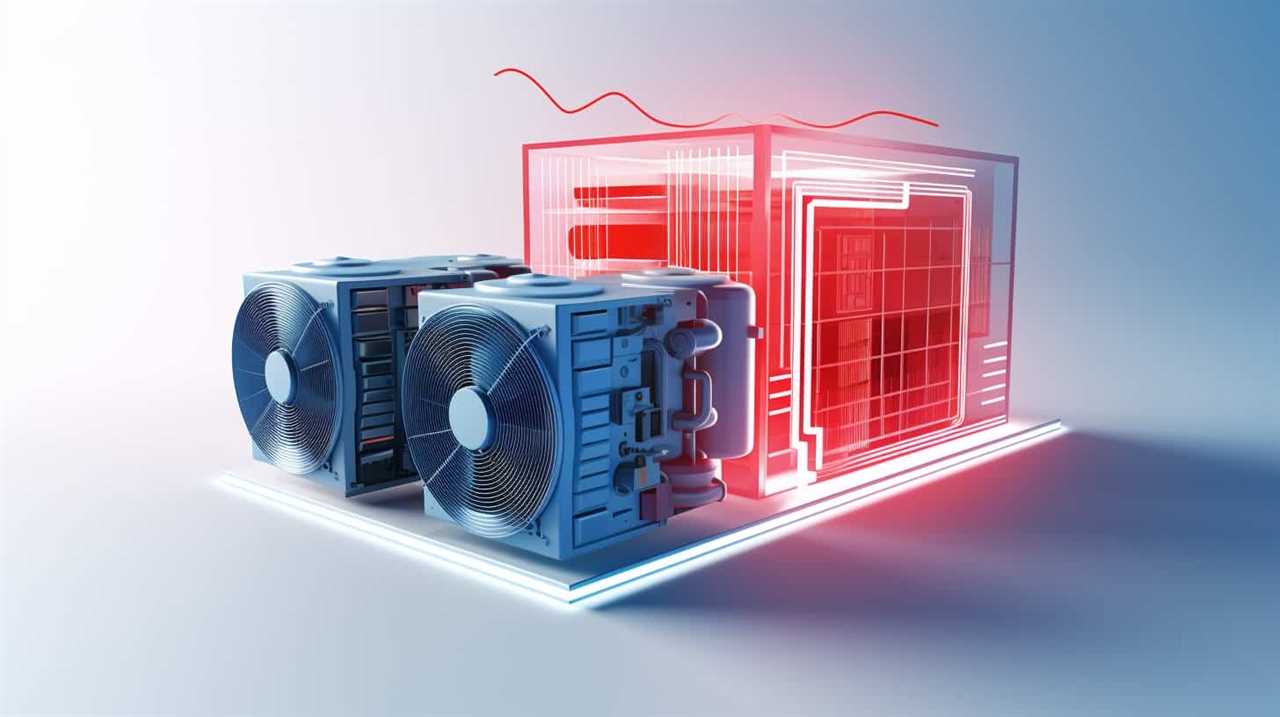
Occupancy Sensors: Some smart thermostats are equipped with occupancy sensors that detect when a room is unoccupied. This feature automatically adjusts the temperature to save energy.
Energy Usage Reports: Smart thermostats provide detailed reports on your energy consumption, allowing you to identify areas for improvement and make informed decisions to further optimize your HVAC system.
Impact of Automation Systems?
With the advancement of automation systems, we can now optimize the energy efficiency of our HVACs by integrating smart technology. Automation systems allow us to control and monitor our heating, ventilation, and air conditioning units remotely, resulting in significant energy savings. By using smart thermostats, we can adjust the temperature settings based on our preferences and schedule. These thermostats can also learn our habits and adjust the HVAC system accordingly, ensuring that energy is not wasted when we are not at home. Additionally, automation systems can provide real-time data on energy consumption, allowing us to identify areas where we can further improve efficiency. By utilizing automation systems in our HVACs, we can not only save energy but also reduce our carbon footprint.
| Benefits of Automation Systems in Energy-Efficient HVACs | ||
|---|---|---|
| Remote control and monitoring | Energy savings | Real-time data on energy consumption |
| Adjust temperature settings based on preferences and schedule | Reduce carbon footprint | Identify areas for improvement |
| Learn habits and optimize HVAC system | Increase comfort | Improve overall energy efficiency |
How Proper HVAC Maintenance Can Improve Energy Efficiency
Regular HVAC maintenance can greatly improve energy efficiency. By following these HVAC maintenance tips and energy saving techniques, you can ensure that your HVAC system operates at its highest efficiency, saving both energy and money:

Clean or replace air filters regularly: Dirty filters restrict airflow, making your HVAC system work harder and use more energy. Regularly cleaning or replacing air filters can improve efficiency by up to 15%.
Check and seal ductwork: Leaky ducts can result in significant energy loss. Inspect your ductwork for leaks and seal them properly to prevent air leakage and improve energy efficiency.
Schedule professional maintenance: Regular maintenance by a professional HVAC technician can identify and fix any issues that may affect energy efficiency. This includes checking refrigerant levels, cleaning coils, and ensuring proper system operation.
Upgrade to a programmable thermostat: A programmable thermostat allows you to set temperature schedules based on your daily routine, reducing energy consumption when you’re away from home.

Exploring Different Types of Energy-Efficient HVAC Systems
Upgrading to energy-efficient HVAC systems can significantly reduce energy consumption and lower carbon emissions. When exploring different types of energy-efficient HVAC systems, it’s important to consider the various HVAC technologies and energy-saving strategies available.
One option is a high-efficiency air conditioner, which uses advanced technology to cool your home while minimizing energy usage.
Another option is a heat pump, which can both heat and cool your home efficiently by transferring heat between the indoors and outdoors.
Additionally, geothermal HVAC systems utilize the constant temperature of the earth to provide heating and cooling.

Smart thermostats are also gaining popularity, as they allow for precise control over temperature settings and can learn your preferences to optimize energy usage.
Factors to Consider When Choosing an Energy-Efficient HVAC
When choosing an energy-efficient HVAC system, there are two important factors to consider: cost versus efficiency and environmental impact assessment.
Cost versus efficiency involves weighing the initial investment of the HVAC system against its long-term energy savings.
On the other hand, environmental impact assessment involves evaluating the system’s carbon footprint and its contribution to greenhouse gas emissions.

Cost Vs. Efficiency
Considering the cost of operation and the efficiency of an energy-efficient HVAC system is crucial when selecting the best option for our homes. To make an informed decision, here are four factors to consider:
Cost effectiveness: Look beyond the initial purchase price. Consider the long-term savings from reduced energy consumption and lower utility bills. A slightly higher upfront cost may result in significant savings over time.
Energy efficiency: Look for systems with high SEER (Seasonal Energy Efficiency Ratio) ratings. The higher the SEER rating, the more energy efficient the system. This translates to lower operating costs and a reduced environmental impact.
Maintenance and repair costs: Consider the long-term maintenance and repair expenses. Some systems may require more frequent servicing or have expensive replacement parts. Opt for a system with reliable performance and affordable maintenance.
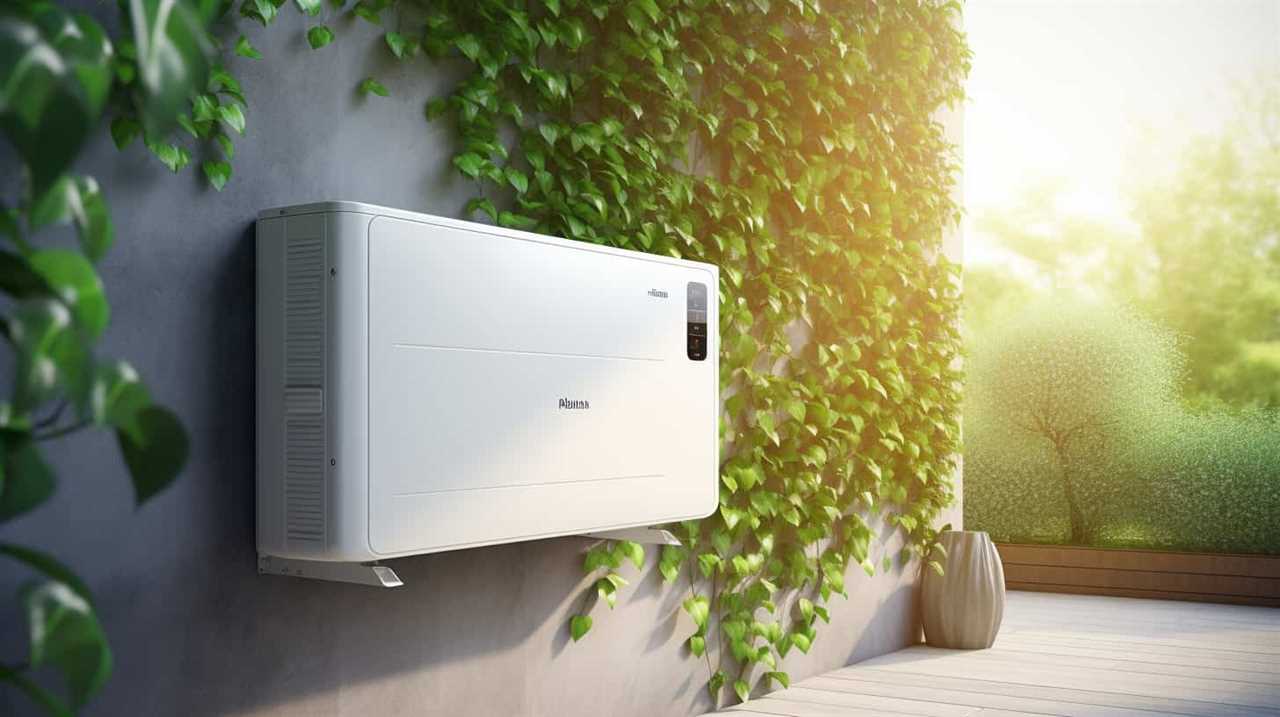
Rebates and incentives: Check for available rebates and incentives offered by energy companies or government agencies. These can help offset the initial cost and further enhance the cost-effectiveness of your energy-efficient HVAC system.
By carefully evaluating the cost and efficiency factors, we can make an informed decision that not only provides long-term savings but also reduces our environmental impact.
Now, let’s move on to the next section about the environmental impact assessment.
Environmental Impact Assessment
To minimize our ecological footprint, we should prioritize energy-efficient HVAC systems that have a low environmental impact and contribute to sustainability. When choosing an energy-efficient HVAC, it’s crucial to consider its environmental impact.

One factor to consider is the use of energy efficient building materials. These materials help reduce energy consumption and minimize greenhouse gas emissions during the production process.
Additionally, it’s important to opt for HVAC systems that utilize renewable energy sources. This could include systems that are powered by solar panels or geothermal heat pumps. By harnessing renewable energy, we can significantly reduce our reliance on fossil fuels and decrease our carbon footprint.
Ultimately, choosing an energy-efficient HVAC system that incorporates energy efficient building materials and renewable energy sources is a vital step towards creating a more sustainable and environmentally friendly future.
Case Studies: Real-Life Examples of Energy-Efficient HVAC Success
We have analyzed several real-life examples of energy-efficient HVAC systems that have successfully reduced energy consumption in homes. Here are four noteworthy case studies:

The Smith Residence: By installing a geothermal heat pump, the Smith family reduced their energy consumption by 50%. The system utilizes the earth’s natural heat to warm the home in winter and cool it in summer, resulting in significant energy savings.
The Johnson Apartment Complex: Through the use of smart thermostats and zone control, the Johnson Apartment Complex achieved a 30% reduction in energy usage. The smart thermostats automatically adjust temperature settings based on occupancy, while zone control allows residents to heat or cool individual rooms, avoiding wasted energy.
The Greenfield Office Building: Through a combination of energy-efficient HVAC equipment, such as high-efficiency air conditioners and furnaces, and proper insulation, the Greenfield Office Building achieved a 25% decrease in energy consumption. The building’s occupants enjoy a comfortable working environment while minimizing their carbon footprint.
The Thompson Retail Store: By implementing a demand-controlled ventilation system, the Thompson Retail Store reduced energy consumption by 20%. The system monitors carbon dioxide levels and adjusts ventilation accordingly, ensuring optimal air quality while minimizing energy waste.
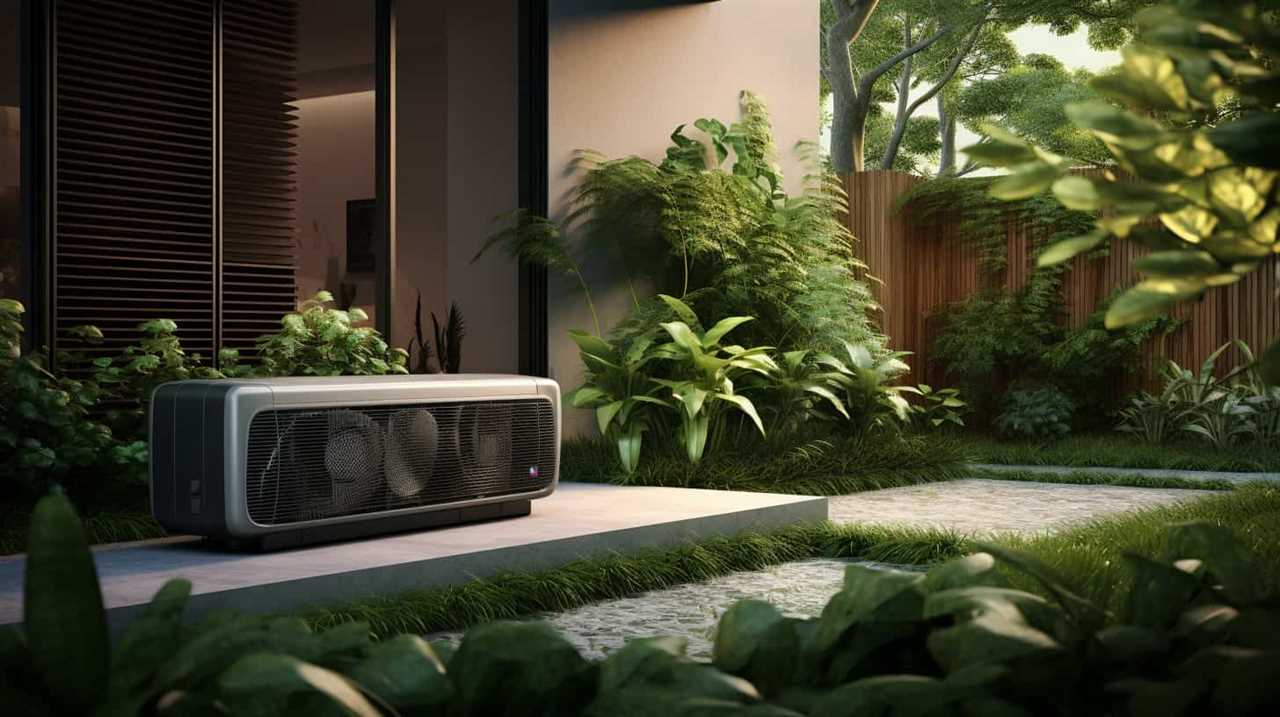
These real-life examples demonstrate the effectiveness of energy-efficient HVAC systems in reducing energy consumption, lowering utility bills, and contributing to a more sustainable future.
Tips for Maximizing Energy Efficiency in Your HVAC System
Let’s explore practical tips to enhance the energy efficiency of your HVAC system and reduce your carbon footprint.
Maximizing savings and reducing your carbon footprint can go hand in hand when it comes to your HVAC system. Firstly, ensure regular maintenance by scheduling professional inspections and cleaning to keep your system running smoothly.
Secondly, consider upgrading to a programmable thermostat that allows you to set different temperature levels throughout the day, optimizing energy usage when you’re not at home.

Another tip is to seal any air leaks in your home, such as around windows and doors, to prevent cool air from escaping. Additionally, proper insulation in your home can greatly improve energy efficiency.
Finally, don’t forget to regularly clean or replace air filters to maintain optimal airflow and energy efficiency.
Frequently Asked Questions
Are Energy-Efficient HVAC Systems More Expensive Than Traditional Systems?
Energy-efficient HVAC systems can be more expensive upfront compared to traditional systems. However, they offer long-term savings through reduced energy consumption. The cost comparison should consider the potential savings and environmental benefits.
How Much Money Can I Save on My Energy Bills by Using an Energy-Efficient HVAC System?
We can save a significant amount of money on our energy bills by using an energy-efficient HVAC system. Not only does it reduce our environmental impact, but it also provides innovative technology for a more comfortable home.

Can I Still Receive Tax Credits or Incentives for Purchasing an Energy-Efficient HVAC System?
Yes, tax credits and incentives are still available for purchasing energy-efficient HVAC systems. For example, the federal government offers a tax credit of up to $500, helping to offset the cost while reducing energy bills and carbon emissions. However, it’s important to consider the downsides and limitations of these systems as well.
How Do Energy-Efficient HVAC Systems Help Reduce Carbon Emissions?
Energy-efficient HVAC systems help reduce carbon emissions by using less energy to heat or cool homes. This results in a smaller carbon footprint and significant environmental benefits, making them a great choice for those seeking innovation and sustainability.
Are There Any Downsides or Limitations to Using Energy-Efficient HVAC Systems?
There are potential drawbacks with energy-efficient HVAC systems, such as higher upfront costs and increased maintenance requirements. However, these are minor inconveniences compared to the long-term benefits they bring in reducing carbon emissions and saving energy.
What Are the Most Energy-Efficient Heat Pump HVAC Systems?
Energy-efficient heat pump hvac systems are designed to provide both heating and cooling for homes while minimizing energy consumption. They utilize advanced technology to transfer heat between the indoor and outdoor environments, offering significant energy savings. These systems work exceptionally well in moderate climates, extracting heat from the air or ground and transferring it indoors during colder months. By optimizing energy usage, energy-efficient heat pump HVAC systems help homeowners reduce their carbon footprint while keeping their indoor environments comfortable year-round.
Conclusion
In conclusion, investing in an energy-efficient HVAC system isn’t only beneficial for your home’s comfort but also for the planet. By choosing a system with high energy efficiency ratings and smart technology features, you can significantly reduce your energy consumption and carbon footprint.

Imagine coming home to a cozy and warm house while knowing that you’re contributing to a greener and more sustainable future. Make the smart choice for both your comfort and the environment.




